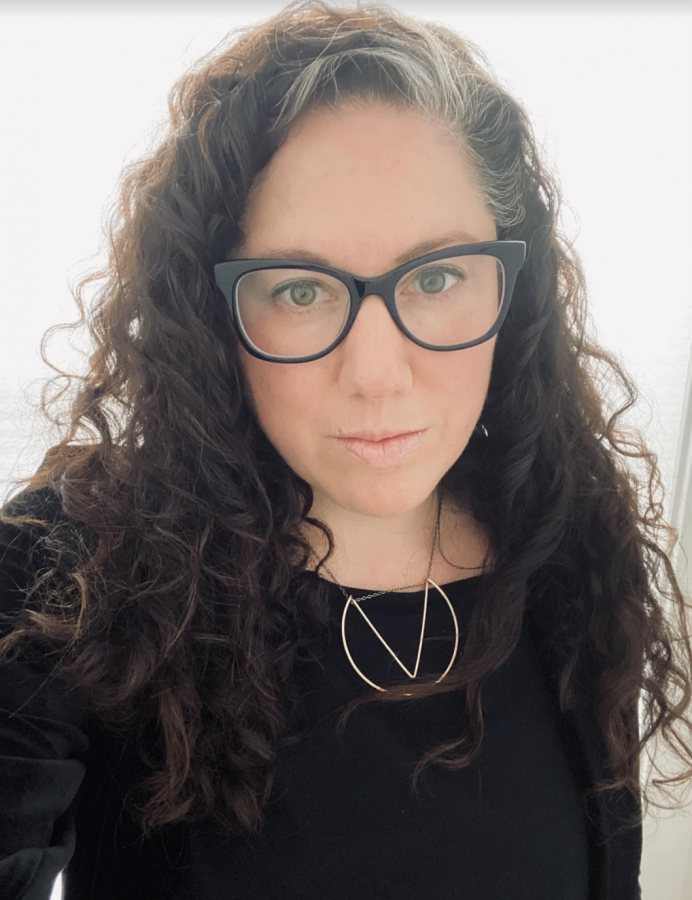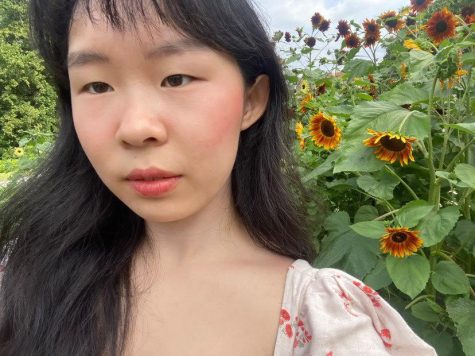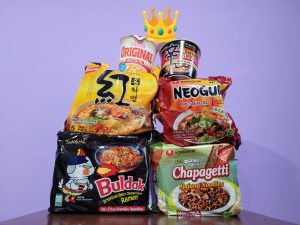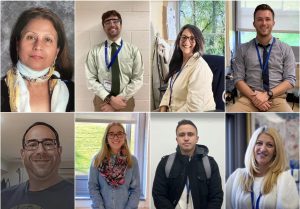Notable Alumni Interview Series #1: Erika Meitner
November 8, 2021
Erika Meitner (Class of ‘92) is the author of five books of poems, including Holy Moly Carry Me (BOA Editions, 2018), which was the winner of the 2018 National Jewish Book Award, and a finalist for the National Book Critics Circle Award. Her next book, Useful Junk, is forthcoming from BOA Editions next spring. She is currently a professor of English at Virginia Tech.
Sophia Liu: How was your time at Great Neck South High School? When did you attend? What was your most memorable experience?
Erika Meitner: I graduated in 1992 and started in 1988. It was a very different time. We had no cell phones and no internet, so we were really analog. I was involved with the newspaper and Exit 33, the literary journal. At one point, I was one of the Op-Ed editors on the newspaper. I’m super heartened to hear that Exit 33 still exists. I also played in the orchestra as a violinist, and one of my favorite things was playing in the pit for operas. I wasn’t very good, but it was really fun. I enjoyed all of the resources the school had to offer.
One of the great things about high school was having a group of friends that I ended up keeping with me, who still are some of my closest friends. That’s actually kind of unusual in that there are people who I still consider intellectual peers and people who I have long-running relationships with, in ways that I think go beyond normal high school friendships. A bunch of us went to Dartmouth up in New Hampshire.
I dabbled in the fencing team. I had friends on the archery team, and I don’t know any schools around here that have an archery team. And this was pre-Katniss Everdeen. The proximity to the city meant that we were able to do things both kosher and non-kosher, culturally and otherwise, that we wouldn’t normally have access to if we lived somewhere like where I live now in Blacksburg, Virginia. We could go to the Met and MoMA; we could also sneak out and go clubbing at night.
SL: We don’t have an archery team now.
EM: That’s so upsetting. Is fencing still there though?
SL: Yep.
EM: Okay, good.
SL: Did you start writing poetry in high school?
EM: I started writing poetry in seventh grade with Mr. Virsa, my English teacher. He was amazing. Then I continued through high school, both publishing poems in and helping edit Exit 33.
I recently found my very first national publication in Sassy magazine, which is like a Seventeen magazine, but for grungy hip girls. It was the bomb back in 1992. My first poem was published there in 1992, in April of my senior year, and that was a big deal.
SL: Was there a teacher at South that particularly influenced you?
EM: Norm Wheeler was a legendary teacher, who taught the course “Integration of Knowledge.” Norm Wheeler was famous for tracking us down to bring us assignments when we were cutting class.
My Latin and Greek teacher in high school was Dr. Tony Pontone, who had been there for like a million years. That class was influential in the way I chose to write poems because we studied Catullus in AP Latin. A lot of my background in terms of etymology and syntax comes from that.
SL: Was there a teacher that helped shape your writing?
EM: Actually, no. I first discovered that there was such a thing as a living poet in my junior year when my friend took me to a reading that Allen Ginsberg was doing in the city. His dad was a professor at Harvard, so he knew about literary and cultural stuff that I wouldn’t have known about because English wasn’t either of my parents’ first languages, and being a writer was not something that was valued in our family culture. I think that’s pretty common for immigrant kids: their parents want them to be professionals, not artists, but my friend said, “Come on, we’re gonna go to the city and see Allen Ginsberg read!” I had no idea who Ginsberg was. Then this guy walked on stage with a beard and a flowing white kaftan and started playing bongo drums and reading poetry and I thought, This is the greatest thing ever. That was the first time I encountered a living poet but up until then, all of the poets that we had studied were dead.
But I loved my English class—we read a ton of great novels, but poetry was just not something that I think a lot of the teachers were fluent in.
SL: In an interview published in the Kenyon Review, you said that growing up in a super-Jewish neighborhood was overwhelming. I think that a lot of students can relate to this because Great Neck has a substantial Jewish and Asian population that often feels like a protective bubble that is not representative of the real world. Because of this, there’s a cultural pressure to conform and succeed in a certain way. How did you navigate your identity growing up?
EM: When I was growing up, Great Neck was probably about 40% Jewish and then about 40% Korean, which made for a really interesting cultural exchange. But because certain values are shared, it made for a pressure cooker in terms of competitiveness and parental pressure. I think one of the funniest things is I didn’t meet a white Anglo-Saxon Protestant person until I went to college. We just didn’t have other ethnic groups in school that were traditionally white in that way. It was only in college when I learned that the predominant ethnic group in the US is white Protestants.
I think that’s something that’s indigenous to New York: it’s pretty common to grow up in ethnic communities: sometimes closed ethnic communities and sometimes integrated ethnic communities. I first grew up in Queens, and my family moved to Great Neck when I was in middle school. Queens was an immigrant neighborhood, so the delineation was whether or not you had to translate for your parents or didn’t, but everyone’s parents were not from the US. When I got to Great Neck, it was a little bit more mixed. There were definitely families who had been there for a little bit longer.
My response was to flee. When I got to college, I went to the place I could find that was the least like the place I grew up. It was very rural and conservative. And I was a super liberal feminist. And so I felt like here’s a place that needs me, they need a liberal Jewish feminist. I navigated my identity by leaving the comfort zone of the ethnic groups I knew at home behind.
SL: How did this impact your poems?
EM: I’m an academic, and it’s like being in the Domestic Foreign Service: you go where the jobs are. I ended up in rural Appalachia. I have two sons: one of my sons is African American, and one is white. So we’re a multiracial Jewish family in the Appalachian south in the twenty-first century. That is a rarity down here. What it’s allowed me to do is to write about issues of religion, race, and culture. I live here now, not as an Appalachian by heritage, but by happenstance. It allows me to write about certain things with a perspective where I’m speaking from both inside of it and outside of it at the same time. I think it can be hard in practice, but valuable as an artist.
SL: You’ve also moved to many other cities for fellowships and jobs. Could you describe that shift and how the environment affects your work?
EM: After college, I got a fellowship in Jerusalem. I’ve also lived in Brooklyn; Santa Cruz, California; Madison, Wisconsin; and Charlottesville, Virginia. I’ve realized that I thrive off of the energy of human geography. I find it overwhelming to write in cities like Jerusalem and New York, so I like visiting really urban areas now and taking material back to make poems out of it.
SL: Did spending your childhood in a Jewish neighborhood make you more aware of the injustices that Jews face? Did it influence you to pursue an MA in Religious Studies?
EM: I grew up as the granddaughter of Holocaust survivors. My mother was born in a displaced persons camp after my grandparents were liberated from Auschwitz. My father’s family fled Czechoslovakia and settled in what was then British Mandate Palestine and became Israel. They both came over when they were kids to the US.
My family history more than anything kind of contributed to my ideas around social justice, and the importance of that to both my work and my teaching. I was also raised in the reform movement of Judaism, which talks a lot about Tikkun olam or fixing the world. It’s a form of Judaism where social justice is one of the main tenets. That definitely has influenced my work and the way I live my life.
SL: Being a poet from an immigrant family isn’t what’s traditionally encouraged. When did you make the choice to become a poet?
EM: I started college pre-med and I did so poorly in my math and science classes that I almost flunked out of college. But I was the student assistant for the English department for all four years in college. The way Dartmouth had their English department set up was that the bottom floor was a poetry library and the very top floor where I sat and ran errands was in the part of the library that had faculty publications sitting on this long wooden table. So when I wasn’t working, I read all of it. Eventually I kept taking English literature and creative writing classes and realized I was decent at it in the sense that I wasn’t flunking out of college. I ended up graduating with a degree in creative writing and English literature.
Of course, my family was like, “What are you gonna do with that?” At Dartmouth, they do corporate recruiting. I went through that process and ended up with my first job out of college as a systems consultant for what’s now Accenture, but was then Anderson. They trained me to program computers for corporations. I worked for Merrill Lynch and Bell Atlantic. My family was like, “Okay, you have a corporate job, you’re not a total failure.” But I hated that job. And I found myself spending all my lunch hours at the bookstore. Eventually, I quit that job to teach public school in the New York City School System.
That was a really hard job because I was teaching basic literacy in an underserved school to sixth and seventh graders who still couldn’t read. Working with books and students made me realize I love teaching.
I ended up going back to grad school. If you’re a decent writer and teach university students, you’re fully funded. So my family wasn’t going to tell me not to do a free graduate degree. I was able to keep going. But all the time I always had a backup plan. I worked in the summer of grad school as a consultant. I always thought, if I’m not able to teach at the university level, I’ll make sure I have my certification to teach K-12. That part of my immigrant childhood I kind of carried forward: you always need a plan B as well as a plan C, just in case Plan B doesn’t work out.
SL: A lot of your work is driven by the current political climate. In Holy Moly Carry Me, you were inspired by the Sandy Hook shootings and gun culture in Appalachia. How would you define a writer’s obligation to the world, to their community, and to themselves?
EM: There’s so much room for so many different kinds of poems that I would never say you have to write a poem that’s political, or you have to write a poem that brings the world in. But I do think one of the things about poetry versus an Op-Ed, is that it’s uniquely suited to try to plumb the complications of hot-button or trigger issues. And so for me, one of the things I was trying to explore in my last book, Holy Moly Carry Me, was biblical injunctions of what it means to love your neighbor as yourself when you have really different values from them and why so many people around me owned firearms or felt threatened, when in fact, they had never been in a position like my family had, where everyone was trying to kill them because of their identity. When I come to poems, I often come with questions, not answers. And I use a braided narrative to put things up against each other, so that the juxtaposition causes people to think.
SL: You published your first book, Inventory at the All-Night Drugstore, in 2002. Now, with Useful Junk forthcoming in 2022, do you approach writing differently? How has your writing changed through time, especially in the past years where politics have become more polarized?
EM: My first book was about my experiences as a teacher and the trials and tribulations that my students were encountering, and how those were impacting me, and the urban landscape around me. The really interesting things about growing up in New York in the late 80s and early 90s is that it was the height of the crack and the AIDS epidemics. There was a massive homeless crisis. New York was just coming out of declaring bankruptcy in the mid-70s. And so it was a really different city in a really different landscape.
When I moved back as a grown-up to teach in the mid to late 90s, it was interesting to chronicle. In my first book, I was inspired by that breadth of human geography and how the city was transitioning from how I remembered it as a kid.
In my newest book, part of it are letters between me and a millennial named Hillary about various topics such as electronics and Instagram selfies. That book explores how we see ourselves, particularly as women. It’s much less political, I think, compared to Holy Moly Carry Me, but when you write about women’s bodies, saying anything is less political, maybe is a misnomer. But it feels like a more personal book about bodies, aging, perception, and photography.
My process has changed a lot in that I write not less from my own life, but maybe less narratively, and in my new poems, I tend to start with the titles. So I’ll always start by putting a title at the top of a poem. And often it’s ekphrastic.
Whereas when I was writing when I was younger, I always started with narrative. My ability to pull a poem out of thin air, starting just with a title is something I really love about writing now that I wouldn’t have been able to do back then.
SL: You mentioned in an interview with Sally Bliumis-Dunn that you read a lot as a kid to gather information because your family narratives from the Holocaust were so traumatic that no one talked about them. What is a writer’s responsibility to cement their own history and how does your work respond to this?
EM: My grandmother survived Auschwitz, but no one talked about the war. She told me the numbers tattooed on her arm were her phone number when I was a kid. It wasn’t until the late 80s that Steven Spielberg started the Shoah Foundation and the Fortunoff Archive at Yale started sending people around to interview survivors of the Holocaust because they realized they were dying, and they wanted to record their testimony. Testimony is something really different than narrative. It’s almost something you’d give in court, right? And narrative is also squishy—it’s not the same thing as even someone telling you what happened to them. We use narrative to make sense of experiences often and to shape them.
But because of what happened to my grandparents and a lot of the people in that generation, they’re not narratives. They didn’t have happy endings, and they weren’t able to ever make sense of what happened in a way that’s manageable. So it wasn’t weird to me that they didn’t talk about it.
The way I ended up learning about what happened during World War II was through literature. It was through the Diary of Anne Frank, through Simon Wiesenthal’s writing about Nazi hunting, through Primo Levi—through these artists who were able to articulate in factual, but also lyrical ways what had happened to them in a way that could reach an audience.
I often write to record what happened, but sometimes that’s not why I write at all. In my own work, it’s been divided in certain ways where I actually do big documentary poetry projects with photographers where I’ll go on the road to document social issues in various urban environments. I just published a big project on sea level rise in architecture in Miami. That work is very public-facing, and is meant to document and bring attention to a social issue: global warming, and displacement. But then I also write personal work solely for myself. And if it resonates with an audience, that’s great too.
SL: Could you talk more about your documentary projects?
EM: The magazine Virginia Quarterly Review sent me to Detroit with a radio journalist right before and during bankruptcy to try to find people who had been in abandoned spaces that a photographer had photographed like abandoned auto plants and schools. The way in for me was I had been writing off of all these photographs of Detroit, but I had never used my experiences.
I have another degree: most of a Ph.D. in religious anthropology, though I never finished it. I had spent time interviewing people about their religious practices and spaces, so I was trained to do field work, gather images, and interview people.
VQR commissioned me again to do a project on Cleveland during the Republican National Convention in 2016. They sent me out with a war photographer and it was a really militarized environment.
While I’ve been living in Virginia, I’ve started going to gun shows with a different photographer. But it turns out, you can’t take pictures at gun shows. That project became actually some of the poems in Holy Moly Carry Me with no photos.
I’ve also been working on a Miami project for four years with a photographer named Anna Maria Barry-Jester, who’s a public health journalist. It’s a really long-running project that we happen to sell part of to VQR. But it wasn’t commissioned like the other ones. Working on commission is pretty unusual for a poet; it’s more of what a journalist would do. It’s a really interesting way to combine my interest in large-scale issues of urban interest and social justice and social change with a slightly different kind of poetry and an artistic visual medium.
SL: Your children show up repeatedly in your work. How did having children affect your work? Does raising children influence your worldview?
EM: Yes and yes. I have way less time to write, and I write in much shorter intervals. Having children makes people more open to and wary of the world in certain ways, and it definitely changes your interactions because not only are you constantly interacting with your children, but they’re interacting with the world and you see how other people interact with them. For us, we have the added layer of being what our adoption agency would call a conspicuous family. If I’m out with my youngest son, people often try to figure out why we are together because we don’t look anything alike. And those interactions can sometimes be fraught. For example, if my son throws a tantrum in the supermarket, I have to worry about people thinking I’m kidnapping him.
Being a multiracial family has really changed my writing in that it has changed my interactions with the world. The first three, four years, when you have a kid, they’re constantly attached to your body in some way, whether it’s in your shopping cart in the supermarket, or strapped to you in a BabyBjorn, or in your arms—you become almost one body moving through the world.
Parenthood ends up changing you because you’re moving through the world as a dual body. Now that my kids are older, it’s a lot harder to write about them because I need their permission and what I can say is a lot more limited. I’m curious to see how that works going forward.
SL: One of my favorite poems from Holy Moly Carry Me is “Jackhammering Limestone,” where you end with this beautiful line “The future is throttling towards us and it’s loud and reckless.” What future do you envision for your children? And how do we get there?
EM: I have no idea. Everything seems so apocalyptic right now. I feel like the baby boomers wrecked it for all of us. But I’m really hopeful for my students—maybe you all can fix this mess better than Gen X. Gen X is just holding it together at this point.
SL: What advice would you give to students, writers, or anyone in the process of figuring out themselves and their future?
EM: I would give them three pieces of advice. One: because of the Internet, you can read living poets from all over the world. Sign up for Poem-a-Day from the Academy of American Poets and read literary journals like Adroit, which was founded by a high school student. There’s so much good poetry happening online that wasn’t accessible when I was younger. Enter a conversation rather than having a monologue with yourself. Second: be tenacious and don’t take rejection personally that it makes you stop writing. Third: find friends who like who you like and make a support group.
SL: Your new book Useful Junk is coming next spring! How does this collection differ from your previous books and what can we expect?
EM: This book is more internal. I wrote it just for myself. My main question for this book is how do our desire(s), singular or plural, keep us alive. One of the things I’ve noticed as I’ve gotten older is that we can move forward and backward in time at once. We have access to our memories and all the love and intimacy we’ve ever felt. I wrote my new book as a shout against the dying earth.
I just had a poem in the New Yorker a couple of weeks ago that’s forthcoming in Useful Junk.
SL: Thank you so much for joining me. To finish off, what are you currently working on?
EM: I’m working on my seventh collection, called Disassembled Audience, after a piece of art by Taryn Simon. This collection falls under ecopoetics: a lot of the poems are about the environment, global warming, the pandemic, and the apocalypse.
Many poems are from when I did an artist residency on a beach in Florida and include sea turtles, red tides, and other eroding beach scenes.









Kelly Spence • Nov 16, 2021 at 2:00 pm
Great article!
Nicole Kinsey • Nov 16, 2021 at 10:24 am
This is so great! I’d love to talk to someone about this series and how we can incorporate it into Career Day activities.
Elizabeth Pongo • Nov 12, 2021 at 10:52 pm
An excellent biographical piece about a brilliant friend of mine! Well done. As a fellow alum, I truly appreciated reading this in-depth interview!